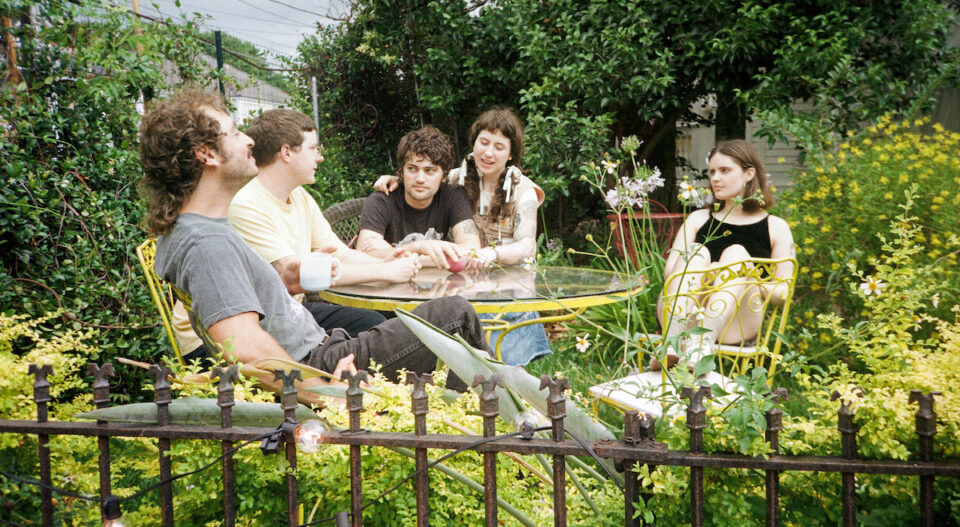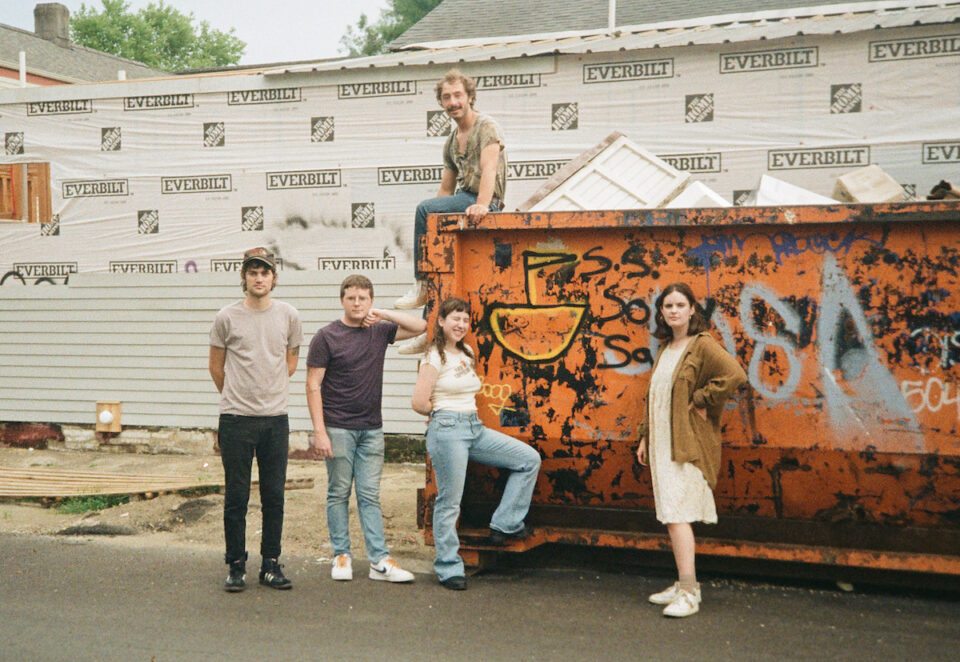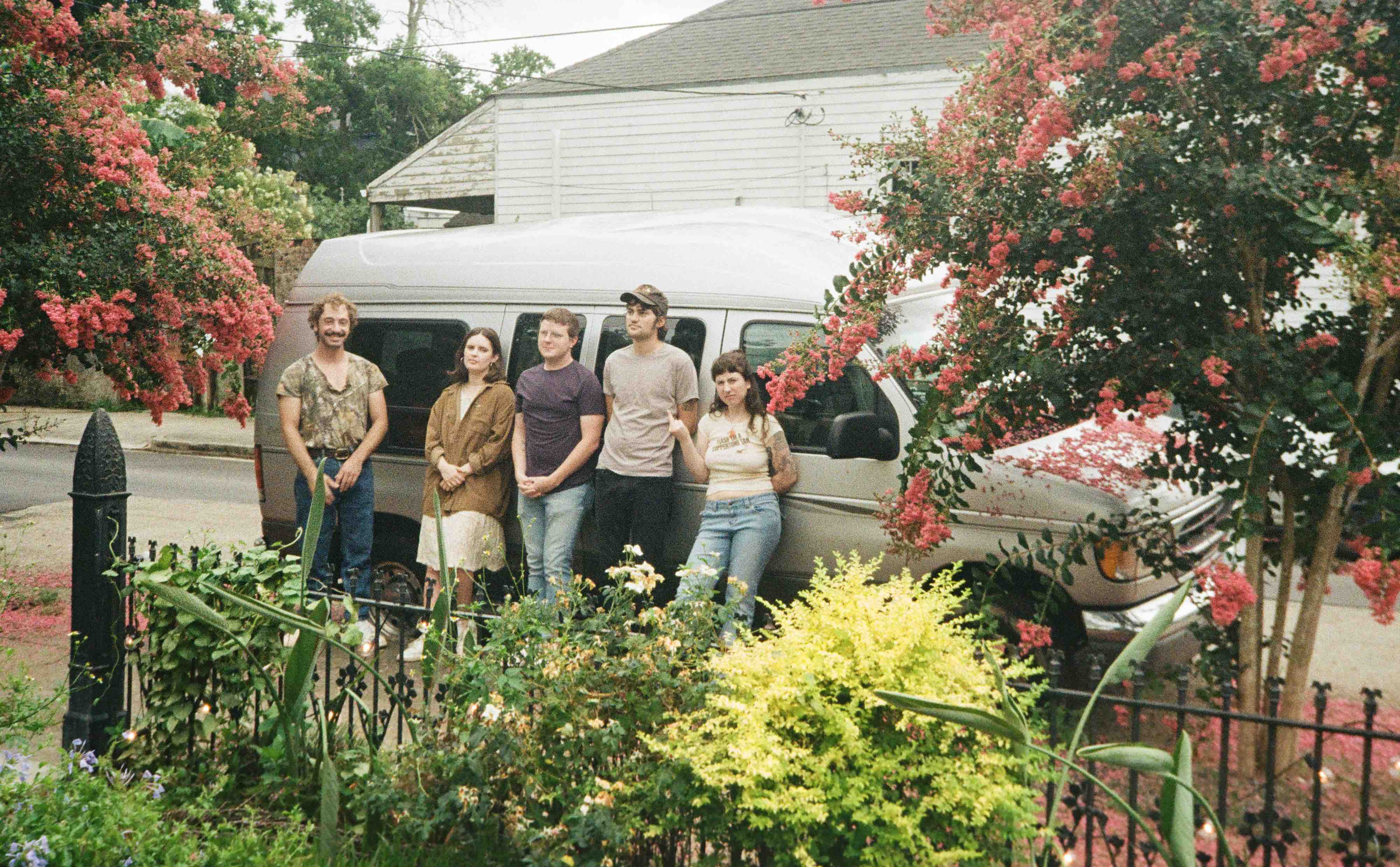On the release day for Wednesday’s breakthrough 2021 album Twin Plagues, songwriter/vocalist Karly Hartzman got a notification that she had zero dollars in her bank account. Recalling this moment to me now over Zoom, she squints off into the distance and laughs: “I’m used to the dynamic of the day you release an album, your life doesn’t change immediately—so I’ve lowered my expectations for what the release day means,” she says in anticipation of their latest album.
The band—composed of Hartzman, MJ Lenderman, Xandy Chelmis, Alan Miller—just finished practice, preparing to play their first shows since last October (they’ve been practicing with new bassist Ethan Baechtold since Margo Shultz’s recent departure.) Even though they all came from the same room, they’ve scattered off to different places for the interview: Chelmis and Miller post up next door at their friend’s house, Hartzman settles down in a brown wooden chair on the front porch, and Lenderman moves to a bedroom attempting to prop his phone up with duct tape. “We were trying to get us all on one screen,” Chelmis laughs. “But that’s not how we like to do it, I guess.”
The band has since released Rat Saw God, their label debut for Dead Oceans and their strongest album to date. These 10 tracks are rugged and wild; then they’re painful, sometimes violent. Most Wednesday songs feel like photos from a loved one come to life. Hartzman embroiders them with intimate peculiarities—getting electrocuted at band practice, a death at a Planet Fitness parking lot. But Rat Saw God puts these stories into motion, unfreezing them in that precise moment. “[This album] establishes that we’re digging a little deeper into the heavy shit,” Hartzman explains. “I like the idea of doing that with a heavier song and then showing that we’re digging deeper into the country aspect, too.”
When I ask what they’ll remember most about this period of their lives down the line, Lenderman matter-of-factly answers: “We’ll know in five years.” Everyone erupts in laughter as he throws his hands up with a toothy grin. Despite the dry logic, he’s right. Similar to their last album release, it’ll take time to see Rat Saw God’s impact on both Wednesday and the rest of the world. Life’s funny that way—you have to let it do its thing.
With the album out now, we spoke to Hartzman, Lenderman, Chelmis, and Miller about how the project differed from Twin Plagues—beyond how it may ultimately prove a bit more life-changing.

Do you guys have a standard of how you approach crafting an album, or does it change with each project?
Karly Hartzman: I bring the lyrics and the guitar part and everyone kind of slowly figures out their parts. But a lot of this album had to be honed in the studio with overdubs. I like how all the decisions were made, but we had less time to sit with stuff. We weren’t able to play most of these songs live, whereas a lot of Twin Plagues we were playing live before we recorded it. We were more affected by constraints, like when we needed to record to get the album out by this time, but I wouldn’t really change anything about it.
Alan Miller: That was definitely a challenge with this one. It was basically like, “When can you get studio time?” We were kind of getting it as a favor, because we weren’t on a big label yet. So we were like, “We just gotta do it.”
Xandy Chelmis: We’ve also talked about changing up our process, though, because we did write a song all together in the studio. That wasn’t on the album, but it was sort of just a fun thing that we did.
“Now that we’re on [Dead Oceans], we can really do this however we want to—we’re not gonna have to worry about deadlines as much.” — Alan Miller
Miller: I’m looking forward to now that we’re on our label, we can really do this however we want to—like a mix of doing some live and then some in the studio—and we’re not gonna have to worry about deadlines as much.
Chelmis: We all started writing and composing music, too. I feel like Karly is always encouraging us to be like, “Here’s something I made, show us what you’re making.” So maybe it will be more collaborative in that sense in the future as we have more time.
Was there something that you didn’t achieve with Twin Plagues that you wanted to with Rat Saw God?
Hartzman: I think the big difference was that the confidence the release of Twin Plagues gave me is very present in my vocals on Rat Saw God. I wish I’d been more confident for some of the vocals on Twin Plagues, but I just didn’t feel affirmed. Not that I care—what the reception is isn’t the main reason I make music, but there’s an undeniable confidence it gives you when people like it. So when Twin Plagues came out, and people were really into it, I felt really good going into the making of this album. I was just self-conscious about my musicianship, because I started playing in like 2018. I felt like I was always catching up, and Rat is the first album that I was like, “I am a musician.”
Miller: A god [laughs].
Hartzman: No, but Twin Plagues is cool because it captures that moment in our career where I wasn’t so confident. When I listen to those vocals now, I can tell how self-conscious I was.
“I was just self-conscious about my musicianship, because I started playing in like 2018. I felt like I was always catching up, and Rat is the first album that I was like, ‘I am a musician.’” — Karly Hartzman
Accepting your faults and forgiving yourself seem like major themes on the new album. Was that another aspect you were conscious of?
Hartzman: It wasn’t on purpose, but I think anytime I write about my past, it results in a lot of acceptance. I think about stuff I used to do, like, “Damn, that’s fucked up,” and I would have categorized myself as traumatized from that a few years ago. But now I look back and I’m like, “Well, maybe I was traumatized a little bit, but those experiences were foundational to me becoming who I am, and I like the way I am now.” Writing is a good way to accept your past, because it helps you make something beautiful. It’s hard not to be kind of thankful for your experiences.

What are y’all’s favorite songs from the album?
Hartzman: “What’s So Funny” is my secret favorite. I like when people fuck with that song, because it’s definitely the quietest and definitely not a party song.
Lenderman: I like “Formula One.”
Chelmis: I think we’ve answered “Formula One” a lot. And “What’s So Funny” is also one of my favorites. The chords on that—I’m like, “This is actually so fucking cool that we made this.” And this is the lowest hanging fruit, but “Bull Believer.” It’s so epic. This is my favorite one to play, maybe the most technically difficult in a way that makes me feel like a buff musician [laughs].
Does that impact your songwriting process, deciding how fun it’s going to be to perform?
Miller: 100 percent. Partially it’s influenced by the lyrical content, but it’s mostly whatever blows our own minds.
Hartzman: We love playing shows, and you want to continue to love playing shows. If the songs aren’t fun to play, like—
Miller: Why would you make it?
“When we’re composing a song—I mean, I’d be lying if I wasn’t thinking, ‘What would whip the crowd into a frenzy?’” — Xandy Chelmis
Hartzman: It’s the funnest part of all of this. A lot of this is cool, like recording and having it on vinyl and putting it out. But nothing dopamine-wise is the same as playing this stuff live. That’s kind of what I feel like I’m living for right now.
Miller: It’s the only time that any of it feels totally real. Everything else is online or removed from you.
Chelmis: And when we’re composing a song—I mean, I’d be lying if I wasn’t thinking, “What would whip the crowd into a frenzy?”
Are you basing that off of actual audience reactions you’ve witnessed, or what, as an audience member, would make you be like, “This fucking goes”?
Chelmis: I think me as an audience member is where my perspective on that comes from.
Miller: It’s like, “What gets me in a frenzy?”
Karly, How do you balance self-reflection versus observations of other things around you?
Hartzman: Something I’ve noticed over time with my writing is that even if something is outside of myself, when I choose to pick that image, it reflects what’s happening inwardly. With my writing at least, I interpret a lot of things on the outside as mini self-portraits. You see something and it feels like, “That’s not me.” But that is like me, that’s what I feel like right now. I don’t know if that’s something everyone deals with, but I get kind of disassociated a lot, and I project myself into abandoned houses or other random shit.
How do you approach writing about your real experiences versus fictionalizing others?
Hartzman: Almost everything on this album is from my actual life. I think the only things that are fictionalized are the first two verses of “Quarry”—the Klutz brothers verse, those are characters in a Lynda Barry book Cruddy that I thought fit into the world. And then the verse about the woman and the candy bars is just a made-up woman. But the second two verses of that song are family stories and real-life stuff.
Chelmis: “Bath County” isn’t totally personal, is it?
Hartzman: Yeah it is, that’s a guy we saw on our way to Dollywood with [MJ]’s dad.
“I try not to write anything that sticks out or feels obviously fake or real. I think a good storyteller is able to weave things that aren’t necessarily true into a true story.” — Karly Hartzman
Miller: You can walk on water?
Chelmis: Damn, I didn’t realize.
Hartzman: [Laughs] OK, yeah, you’re right. That’s a reference to—
Miller: Another fictional character called Jesus [laughs].
Hartzman: It’s a Loudon Wainwright reference. But as long as everything fits into the same world, whether it’s true or not doesn’t really matter—except to me and the people I’m referencing. I try not to write anything that sticks out or feels obviously fake or real. I’m mostly trying to get better at telling a story. I think a good storyteller is able to weave things that aren’t necessarily true into a true story.
When you listen to the album, because these are personal vignettes, what do you take away from it?
Hartzman: I mostly feel glad that I was able to log some of these stories into the vault of culture. A song is forever. It’s always been a goal of mine to make some of these stories that have been in mine and my family’s life permanent in a way, because I think they’re worth telling. I like the idea of logging our little lives into some sort of record…literally a record.
Lenderman: The takeaway, though, I feel like it’s not really for us to decide, because we made it. That’s for everybody else who listens to it to decide for themselves. FL







